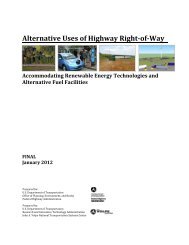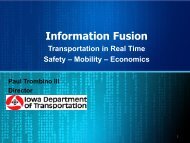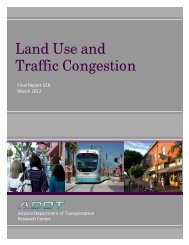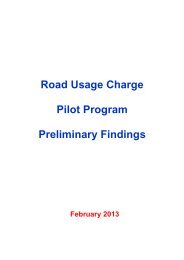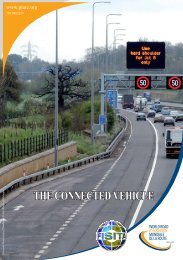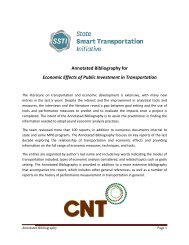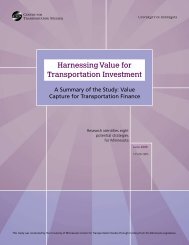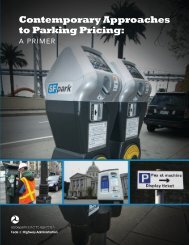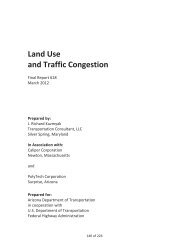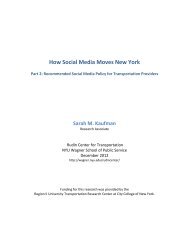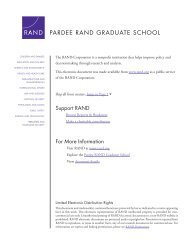Evaluating Alternative Operations Strategies to Improve Travel Time ...
Evaluating Alternative Operations Strategies to Improve Travel Time ...
Evaluating Alternative Operations Strategies to Improve Travel Time ...
You also want an ePaper? Increase the reach of your titles
YUMPU automatically turns print PDFs into web optimized ePapers that Google loves.
SHRP 2 L11: Final Report<br />
Institutional Challenges<br />
To effectively manage the transportation system with a focus on reliability and <strong>to</strong> achieve the<br />
future concept of operations, transportation agencies will need <strong>to</strong> adopt an institutional structure<br />
that is more multidisciplinary, exercise horizontal integration across all focus areas, and facilitate<br />
effective interagency collaboration. The critical change will be <strong>to</strong> focus on systems operations,<br />
rather than on the his<strong>to</strong>rical focus of roadway expansion. A true focus on maintenance and<br />
preservation of the existing system is also essential <strong>to</strong> maintain mobility, since a deteriorating<br />
system could make it exceedingly difficult <strong>to</strong> manage reliability. Because it is unlikely that enough<br />
transportation revenue will be available in the next 20 years <strong>to</strong> replace and res<strong>to</strong>re all aging<br />
infrastructure, infrastructure moni<strong>to</strong>ring will be crucial. Delays due <strong>to</strong> <strong>to</strong>ppled luminaire poles,<br />
traffic signal light outages, bridge expansion, joint deterioration, potholes, and more serious<br />
structural failures could be major contribu<strong>to</strong>rs <strong>to</strong> reduced system reliability in the future.<br />
Infrastructure moni<strong>to</strong>ring systems are likely <strong>to</strong> be a critical part of any attempt <strong>to</strong> assure<br />
transportation system reliability. These moni<strong>to</strong>ring systems can also be used for security-oriented<br />
transportation infrastructure protection.<br />
Systems Management<br />
There are good reasons for systems management <strong>to</strong> be a business practice with supporting<br />
performance measures and outreach materials that report on the benefits of the program. Since<br />
many highway systems of the future are likely <strong>to</strong> be greatly dependent on pricing systems for<br />
revenue, congestion management, and data collection, it will be crucial that the system is managed<br />
with these aspects in mind <strong>to</strong> provide value <strong>to</strong> the traveler. A mo<strong>to</strong>rist who pays a premium <strong>to</strong><br />
arrive at a destination at a specified time (i.e., who pays for a trip of a certain travel time and<br />
reliability) will be a very disgruntled cus<strong>to</strong>mer if the system fails <strong>to</strong> deliver and the trip takes<br />
longer than expected. Depending on the operating policy, the <strong>to</strong>ll or fee for service may need <strong>to</strong> be<br />
refunded. Opera<strong>to</strong>rs of systems that consistently meet mo<strong>to</strong>rists’ expectations and deliver the<br />
expected value can be rewarded. Agencies may wish <strong>to</strong> consider ways <strong>to</strong> measure cus<strong>to</strong>mer<br />
satisfaction and reward efficient system management (possibly with more resources <strong>to</strong> further<br />
improve operations) and penalize inefficient system management (by sending non-performers <strong>to</strong><br />
lower status jobs as is done in the case of non-performing sports team managers.)<br />
Reliability will become even more crucial <strong>to</strong> freight movers. As a result, freight mobility deserves<br />
at least as much consideration as personal mobility. Agency planning procedures will need <strong>to</strong> look<br />
at a wider of range options, such as truck-only lanes, micro-cars, or other vehicles powered by<br />
alternative propulsion systems.<br />
The “Mobility” Agency<br />
This focus on system operations means that many agencies in the future will not only be concerned<br />
with managing the infrastructure that moves vehicles or people from A <strong>to</strong> B but also focus on the<br />
movement of information from A <strong>to</strong> B. Providing the information needed by commuters <strong>to</strong> make<br />
informed decisions on telecommuting based on real-time traffic and infrastructure conditions is an<br />
example of this change in emphasis. The “mobility agency” is envisioned <strong>to</strong> support mobility of<br />
people, things, and ideas. For some modes, it would be an infrastructure owner-opera<strong>to</strong>r, for others<br />
it would be a service provider or a provider of information only. In the new world of cus<strong>to</strong>mer<br />
orientation, this agency is expected <strong>to</strong> be even handed in providing service and advice. Thus, it<br />
would never be an information carrier, like a cell phone company, but it might tell people that<br />
telecommunications is an option. It would not be a central controller of land use, but it may inform<br />
A CONCEPT OF OPERATIONS Page 114



